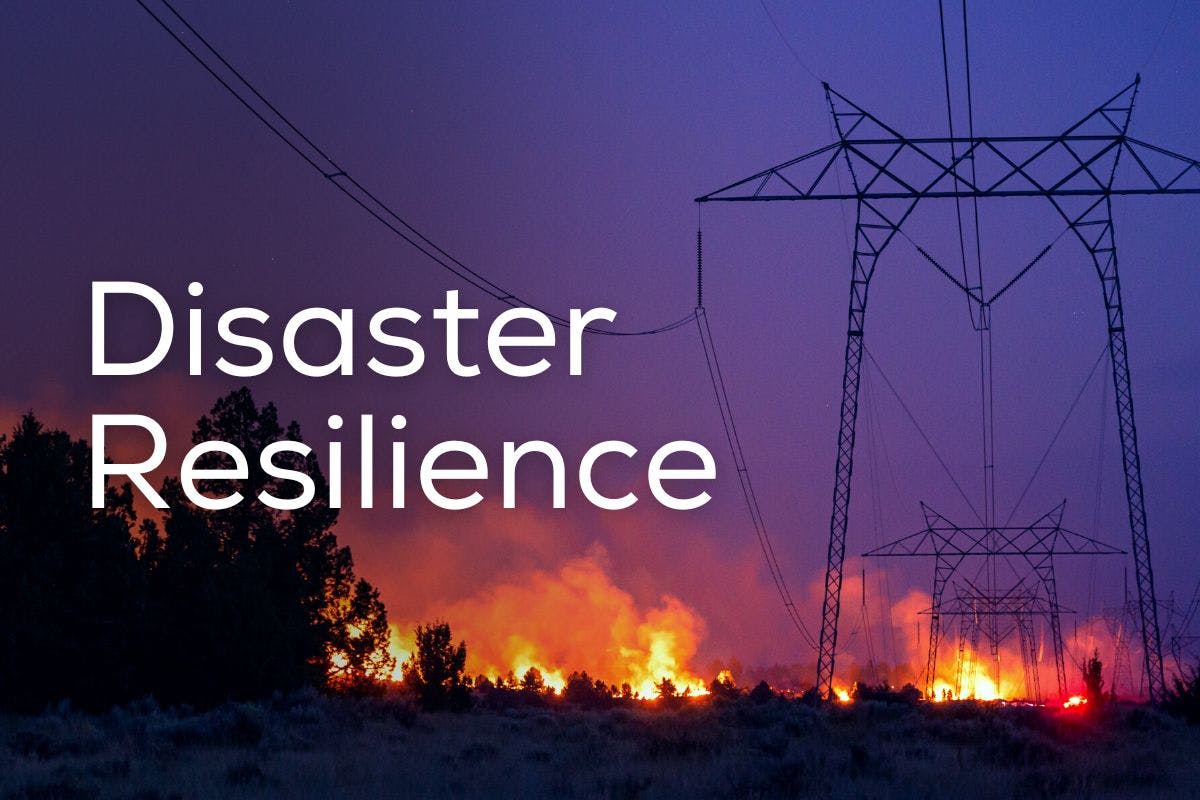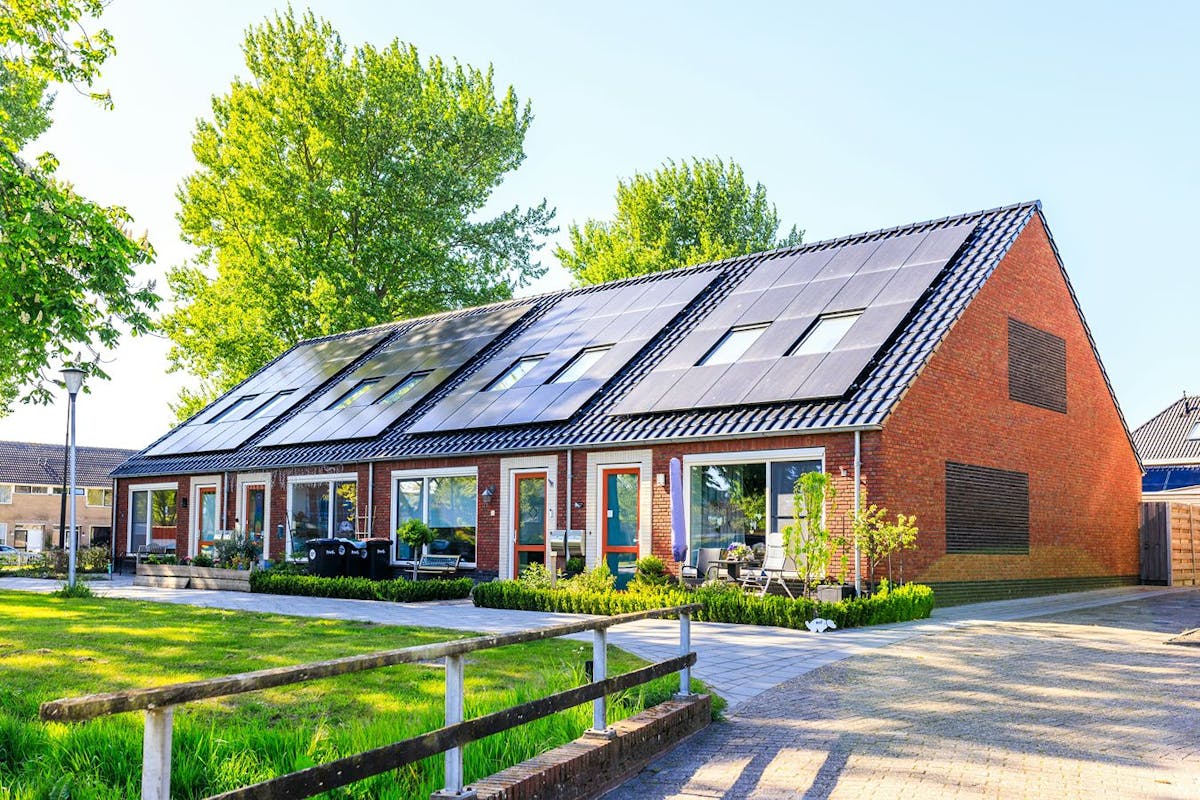How Solar and Storage Can Help You Through a Natural Disaster
Last edited

Author
Andrew Blok
Electrification and Solar Writer and Editor

Editor
Ryan Barnett
SVP, Policy & New Market Development

Weather-related power outages have been on the rise over the last decade, thanks to climate change and aging grid infrastructure. Billion-dollar disasters (as extreme weather intensifies and the price on property goes up) have increased, too.
When the power goes out, it can be an inconvenience. For some people, an outage of a few hours, much less several days, can be dangerous. Traditional backup energy sources, like generators, can be loud, stinky, and, if used improperly, dangerous.
Solar and backup battery storage are a safe and clean alternative. They’re not a one-to-one analog, though. Here’s how home solar panels and backup batteries can help you through a disaster, and how they compare to gas-powered generators.
See how much you can save by going solar with Palmetto
What Is Disaster Resilience?
By definition, disaster resilience is the capacity of any system to anticipate, withstand, respond to, and recover from disruptions in ordinary operations. In terms of access to electricity, disaster resilience can be applied at both small and large-scale levels, with homeowners and utility energy providers investing in emergency preparedness.
Essentially, disaster resilience is not the practice of trying to prevent the worst-case scenario, but rather preparing those affected to bounce back from catastrophes and maintain essential operations moving forward. Looking into long-term solutions, disaster resilience refers to the ability of people and communities to survive, adapt, and grow in the aftermath of a major event.

Credit NOAA
Solar Panels and Disaster Resilience
Solar panels can’t protect you from every risk associated with a natural disaster — they can still be damaged in a severe weather event and don’t provide physical protection — but they can help in the aftermath.
When installed to provide backup power, home solar panels and batteries can provide emergency electricity through an outage. Often, that means powering necessary circuits, not your whole home. The amount of backup power depends on the number of solar panels and batteries you install.
Even without backup capabilities, solar panels can deliver energy bill savings by replacing some or all of the electricity you buy from your utility. There are a few extra considerations for solar panels that provide backup power.
What is solar islanding?
Although a traditional grid-tied solar panel installation is designed to shut down during a blackout, adding battery backup allows system owners to operate independent of the grid.
Solar islanding is the process in which a home can move “off of the grid” and exclusively run its appliances and electrical features with residential solar power produced onsite. By creating its own ecosystem separate from the grid, a solar and storage system can function as a “microgrid” that is completely separate from and unaffected by local brownouts or blackouts.
Depending on the equipment you’ve installed, solar islanding can either be manually or automatically engaged so that your home will pivot from grid power to your personal energy system. With smart inverter controls, disaster-resilient solar panel systems can seamlessly disconnect and reconnect to grid power based on the safety, availability, and cost of local electricity.
Ongoing access to emergency power
Backup solar batteries allow you to continue using your solar panels even if the grid goes down. Throughout a blackout, any excess solar power generated by your system that is not used immediately in the home will go into the battery bank instead of being sent into the grid.
Despite rapidly falling prices in the last decade, typical solar batteries can still cost homeowners upwards of $10,000. To keep costs lower, most solar battery storage systems are sized to provide only enough power to keep emergency appliances running during a blackout. Adding more batteries can allow you to back up more of your home.
See how much you can save by going solar with Palmetto
Reduced grid energy consumption
Even outside of emergency situations, backup batteries can lower your typical energy bills by helping you avoid purchasing electricity from your utility provider.
Battery backups are even more valuable for homeowners in areas that do not compensate solar energy producers at retail rates for electricity sent to the grid. Battery owners can also navigate around time of use (TOU) billing structures to keep their energy expenses as low as possible. (Note: In places with these billing structures, batteries are sometimes installed as consumption only batteries, which lack backup capability. If you want backup power, be sure your battery has that ability.)
Likewise, reducing grid power consumption with a battery-backed solar system helps you avoid electricity generated from coal, natural gas, and other fossil fuels, reducing the greenhouse gas emissions and carbon footprint associated with a home’s power consumption.
In an emergency scenario, any effort to reduce grid energy consumption will directly benefit you and your community. As lines become repaired and more homes in the neighborhood attempt to access power after a blackout, remaining on your solar island can limit the overall strain on the local power grid.
Solar Panels vs. Gas Generators for Disaster Resilience
When disaster strikes, many people turn to gas generators for their home’s power. Gas generators are an excellent solution for temporary power needs, however, they require fuel, can be very noisy, and may emit harmful gasses when in use. If you're looking for a more sustainable way to keep your home running during emergencies, solar panels and solar battery storage may be the right choice.
Solar panels are an excellent investment because they provide long-term energy independence without relying on fossil fuels or noisy generators. Here are five key reasons you might choose solar panels and a battery over gas generators.
Low maintenance
Generators require fuel, which needs to be replenished during emergencies. Not only does this involve actively refilling gas tanks and performing regular maintenance checks, but it also requires trips to the gas station to purchase more fuel during ongoing blackouts. (And fuel can run out during extended disasters when refill delivery is difficult.)
Solar panel and battery systems do not have any moving parts and require little maintenance throughout many years of operation.
Versatility
If you live in a place where having a battery can boost your savings, a backup battery can be useful even outside of a blackout situation. Backup generators only have one use.
Noise
When the electricity goes out in a crowded city, most people are used to hearing the hum of gas generators. Solar and storage systems eliminate many of the aggravating noises associated with traditional generator power.
Safety
Solar energy is also completely emission-free, while gas generators emit smelly and potentially dangerous fumes. Using a generator without all the safety precautions in place can create a dangerous carbon monoxide situation.
Independence
Once they’re installed, solar panels and batteries get all the fuel they need from the sun. That means you’re more insulated from fluctuating gas and electricity prices over the course of your panels’ 25-year lifespan.
Is Global Warming Creating More Natural Disasters?
Yes. Global warming and climate change have led to more natural disasters in the last few decades than ever in recorded history.
According to a study by researchers at Stanford University, between 1980 and 2016, there were 437 weather-related disasters in the United States. Not only was this double the number of disasters recorded from 1950 through 1979, but the study also found that these 437 events cost an estimated $1.5 trillion in damages over 36 years.
Likewise, a separate 2022 report from the National Oceanic and Atmospheric Administration (NOAA) shows that there have been more than 1,000 worldwide natural disasters since 2010. Compared with fewer than 500 disasters between 1980 and 2009, the rate of weather-related catastrophes and the risk of power outages is accelerating.
According to the United States Global Change Research Program, climate change and global warming have already caused dramatic changes in our environment, and may lead to catastrophic effects if left unchecked. The report also highlights the fact that global warming is not just an environmental issue but also one of economic and public health.
As a result of the increasing frequency and severity of natural disasters, renewable energy has become a topic of interest for governments, regulators, and private companies. As natural disasters like hurricanes, earthquakes, tornadoes, and wildfires are becoming more frequent and more devastating, building resilient infrastructures is becoming more urgent. With continued access to independently operated electricity systems, solar power can provide an essential part of disaster resiliency at every level.
Be Prepared and Go Solar Today
For disaster preparedness, solar power and backup batteries can help homeowners increase their energy security and peace of mind with ongoing access to renewable electric power.
If you’re interested in how solar and storage can prepare you for the next outage or how solar can save you money at any time of year, check out Palmetto’s solar savings estimator to get started.
See what solar can do for you:
Frequently Asked Questions
Do all home batteries provide backup power?
No. In some markets, like California, some batteries are installed as consumption only, or arbitrage, batteries. Batteries installed in this setup are used to reduce the amount of grid electricity a house uses to boost savings, but aren’t installed with backup capabilities to reduce the cost of installation.
Will solar panels work through a blackout?
Many solar panels are designed to shut down when the grid goes down because it would be dangerous for them to be sending electricity to the grid while people are working on power lines. With a backup battery, solar panels can separate from the grid and continue generating and storing power while the sun shines.


